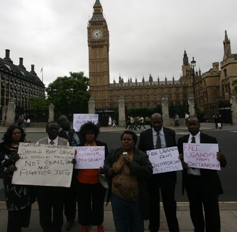Anti-Museveni protest held at British parliament
By Norman Miwambo
20th June 2011:
The political turmoil that has engulfed Uganda since the conclusion of the controversial elections on 18th February intensified last week on Wednesday 15th June as Ugandans living and working in the United Kingdom [UK] staged a protest in London outside the British parliament the House of Commons to highlight Uganda’s democracy deficit to the international community.
After several protests outside the Ugandan Embassy in London that lasted nearly two months, the protesters shifted their campaign and camped in-front of the British Parliament. In an exclusive interview with this reporter, Mr. Moses Luzinda, Chairman of Uganda United Pro-Democratic Forum [UUPDF] said, “…we have seen protesters camping here [outside the House of Commons] and their voices have been heard. That is the reason we have taken the decision to come here”.
Mr. Luzinda also pointed out that the size of the demonstration doesn’t matter that much. “…It is the content of the message to the international community that matters. The streets of Tunis and Cairo were not full of protesters at the beginning but later other people realised the countries’ problems and came on board”, Mr Luzinda told this reporter during last week’s demonstrations.
Luzinda was confident that President Museveni will soon be forced to listen when the donors turn up the heat. “…The signs are there that Museveni will soon budge to the call of the masses when he hears the voices from the donors. What he [Museveni] is saying now is exactly what Zaine al-Abidine Ben Ali, Hosni Mubarak, and Muammar Quadhafi used say”, said Mr Luzinda, in apparent reference to the “Arab Spring” revolutions that brought down the Tunisian and Egyptian Presidents.
Luzinda also points to the fact that like Museveni, ousted Tunisian President Ben Ali had controversially “won” an election with 89.62%, far greater that Museveni’s alleged 67%. “…But Ben Ali still went. It was corruption, unemployment, and high food prices that led a graduate [Mohammed Bouazizi] to set himself on fire”, Luzinda pointed out.
Uganda United Pro-Democratic Forum said it’s going to hold weekly protests outside the British parliament to attract media attention. “…We have seen the media setting the agenda. Ugandans are being killed in cold blood. The local media has been barred from covering the protests in Uganda. The number of people held incommunicado is not known to the outside world”, Luzinda said.
In a long and angry letter released on May 17th, President Museveni criticised the opposition and some sections of the local and international media of tarnishing Uganda’s image. He consequently declared media houses like The Daily Monitor, the BBC, and Al-Jazeera among others as “enemies of Uganda’s recovery”.
Government keeps watch on London protesters
It is therefore clear that the government is concerned about local and international protest activities against what the opposition parties have called its [the government’s] “illegitimacy”. Indeed, during last week’s demonstration outside the British parliament, a man who is known within the Ugandan community and suspected of being a “spy” at the Ugandan Embassy in London was seen taking pictures of protesters from about 100 metres away.
“…We saw him. But we ignored”, said M/s Sarah Male Kamulali, a vocal and consistent anti-Museveni campaigner based in London. END. Please login to www.ugandacorrespondent.com every Monday to read our top stories and anytime mid-week for our news updates.
![]()


